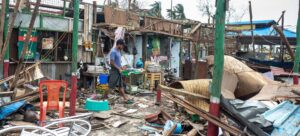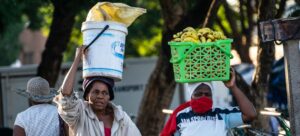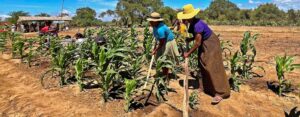Dominica, which lies in Eastern Caribbean, is particularly vulnerable to extreme weather events, which are being exacerbated by the climate crisis: Hurricane Maria in 2017 was a devastating example, destroying many homes and buildings.
The indigenous Kalinago people were particularly affected but, since then, community leaders have been working with the UN to help its people to become more resilient, in anticipation of the next climate shock.
Ahead of the 2024 session of the UN Permanent Forum on Indigenous Issues (UNPFII) Conor Lennon from UN News met Sylvanie Burton – who is both the country’s first Kalinago, and also first woman, Head of State – and Lorenzo Sanford, the youngest-ever Chief of the Kalinago community, to find out how they plan to achieve their goal of making the island the world’s first “climate-resilient” nation, and why the young people of the community are central to the resurgence of the indigenous culture on the island.
Sylvanie Burton (l), Lorenzo Sanford (c), Conor Lennon (r)
Lorenzo Sanford In the past it was always the same people who were elected as chief. I wanted to make a difference, and introduce the views of younger individuals, because our community has many young people, by taking a ground-up approach.
UN News What did the older generations of the Kalinago community think about such a young person being made chief?
Sylvanie Burton The Kalinago population is around 65 per cent young people, so we wanted to give our youth the opportunity to make a difference. We rallied around Lorenzo, which give him the level of authority needed in order to become chief.
UN News What effect did Hurricane Maria have on the Kalinago Territory?
Lorenzo Sanford I was on another part of the island when Maria hit, and I wanted to check on my family. There was no internet, no phone connection, and the roads were blocked, so the only way to return was on foot, using the traditional trails.
When I came across the mountains, everything was brown; there was no greenery anymore. All you could see was destroyed homes, and people looking lost, not knowing what to do.
Sylvanie Burton Before Maria arrived, I knew that our island was going to take a direct hit. So, we called an emergency council and decided to go to the homes of the elderly and take them to the shelters. By mid-afternoon most vulnerable people had been taken to safety.
And then the tropical storm started coming in. The sea was raging and I could hear the roaring of the wind coming up from the valley. The storm pounded us for hours and hours. I started praying, and even asked God why he was not answering our prayers. I was thankful that I was in a concrete structure, and I could only imagine what was happening to our people living in small wooden houses in the rest of the Kalinago Territory.
The next day, after the storm had passed, we though that the sea was very close to our homes. It wasn’t, but it seemed that way because all of the trees and the houses were gone.
It was a very painful experience that you wouldn’t want anyone to go through. It was a miracle that no one in our territory died.
Traditional Kalinago building, reinforced by concrete
UN News Before the hurricane most of the buildings were made of wood, but I’ve seen several concrete homes and buildings. Is that construction part of the effort to make Dominica more resilient?
Lorenzo Sanford Yes. In the Kalinago Territory we have a lot of different housing projects going on. We went into the community with the different agencies that were proposing to help, to see how we could make stronger houses, that would still be built in a Kalinago style. We are also building a large multipurpose community shelter, but we want more people to feel safer in their own homes the next time a tropical storm hits.
UN News Access to reliable information is crucial to saving lives. How are you ensuring that as many people as possible have early warnings about extreme weather events?
Sylvanie Burton We’re working to get better information on the climate and get it out to the population before storms hit. We are also creating ICT (information communication technology) hubs across Dominica, where people can access information before the storms, take precautions, and get to a shelter ahead of time.
Kalinago Territory, Dominica
UN News Raising the finance to deal with the consequences of the climate crisis is an issue for all Small Island Developing States, not just Dominica. You’re not responsible for the crisis, but you’re disproportionately affected by it. Is it getting easier to access the funds you need to adapt?
Sylvanie Burton At the UN climate conferences, we hear the big polluting countries promise to give funds and reduce their own carbon footprint. But these countries need to turn their promises into action.
For example, after Hurricane Maria, the UN Secretary-General came to Dominica, and several countries made pledges to help. But many of these pledges were not fulfilled, so we had to take out loans to ensure that we build a climate-resilient country.
We are very thankful for the UN organizations that are assisting Dominica, and the countries that are assisting, but it will take a little more. These big countries need to put their money where their mouth is!
UN News The Kalinago have been on this island for more than 500 years. Has that accumulated folk knowledge helped you to adapt to the changing climate?
Lorenzo Sanford I would say that it has helped us to bounce back in in a very fast way. For example, our indigenous practices inform how we plant our food. So, we hope that this knowledge will be passed on to younger generations, so that we can safeguard our future, both within the Kalinago Territory and across the whole island.
This interview has been edited for clarity and length.


















